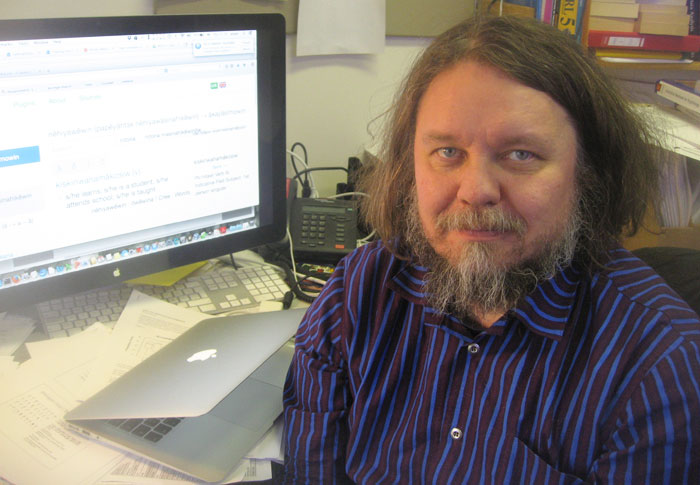
Linguist Antti Arppe's project 21st Century for Indigenous Languages receives 2019 SSHRC Partnership Grant
2019 marks the United Nations International Year of Indigenous Languages, but as University of Alberta linguist Antti Arppe notes, from the perspective of revitalization and sustainability, efforts cannot be restricted to a single year, but instead require decades of dedicated commitment and funding.
Today, the Social Sciences and Humanities Research Council of Canada (SSHRC) announced its 2019 Partnership Grants, naming Arppe's collaborative project, 21st Century Tools for Indigenous Languages to its roster of research partnerships that seek to advance knowledge and understanding of critical issues of intellectual, social, economic and cultural significance.
In Canada, Indigenous languages have been under threat from English and French since well before Confederation. Unlike the two official (majority) languages, Indigenous languages have become predominantly oral - passed down from one generation to the next, making them acutely vulnerable to cultural shifts, population variances and historically, government and institutional suppression. All of the 60+ Indigenous languages in Canada are, to varying degrees, endangered, many critically so.
In the Department of Linguistics, the preservation of Indigenous languages has long been a research priority - from language documentation and acquisition to the development of technological tools to facilitate the use of Indigenous languages in all spheres of life.
What drives much of Arppe's research is the belief that Indigenous languages in their written form deserve the same language technological tools as majority languages, such as electronic dictionaries, spell-checkers and searchable databases that are almost entirely lacking for the many thousands of smaller, Indigenous languages around the world.
"Language equals identity," says Arppe. "It is one of the key channels through which a community's culture, traditions, stories, and values are maintained. The hard truth is - if you do not have at least the most basic language technological tools, that makes using any language, Indigenous or not, more cumbersome and inconvenient in the modern world - for instance on computers and smartphones. Our intention is to help close that gap."
21st Century Tools for Indigenous Languages builds on years of research, and in contrast to theoretically-oriented linguistic work, is aimed squarely at practicality and usefulness within communities of learners. Focused first on Plains Cree (an Algonquian language) and Tsuut'ina (a Dene language) - two of the major Indigenous language families in Canada (primarily Alberta) and North America - the project is deeply collaborative, drawing expertise not only from Indigenous communities, but also from UAlberta Indigenous scholars Dorothy Thunder and Melvatha Chee, as well as numerous national and international partners.
"We've had the time to establish strong connections with the linguistic communities involved, in particular the Maskwacîs Education Schools Commission (Cree), the Tsuut'ina Language Commissioner and the Tsuut'ina Gunáhà Institute (Tsuut'ina)," says Arppe, adding that the long-standing commitment of these Indigenous communities is of paramount importance to the Partnership.
"When a community keeps its language, it retains its identity, world-view, knowledge and relationship with their surroundings, and everything that is incorporated in their own language, passed down over generations."
Arppe came to the University of Alberta via Helsinki, Finland, where he was raised and educated. He says this project combines elements of his previous life, working for a small Finnish language technology company developing similar tools for majority languages in the Nordic countries. Arriving as a post-doctoral research fellow, followed by a permanent, tenure-track position, Arppe and his colleagues in the Department of Linguistics, Jordan Lachler, Juhani Järvikivi and Tim Mills, came up with the core idea based in part on the work of their Norwegian collaborators, the Giellatekno and Divvun research teams at the UiT Arctic University of Norway (in Tromsø). This led to the founding of the Alberta Language Technology Lab (ALTLab), under which the preceding projects and this Partnership will be coordinated.
"We've come to learn the circumstances and contexts of Indigenous languages in Canada and elsewhere in North America differ not insignificantly from the Sámi context," he says, referring to the Indigenous people of northern Scandinavia. "Nevertheless, we view what the Norwegians have achieved for the Sámi languages over now almost two decades as a role model on what our Partnership could deliver on the longer term."
Arppe says the new funding will support the continuation of current activities, "hopefully to their successful completion" and beyond that, will organize and integrate training and capacity-building in the communities - drawing from the University of Alberta's Canadian Indigenous Languages and Literacy Development Institute (CILLDI) course template, as well as on-line computational resources in language instruction and learning.
The Partnership will also continue to organize Computational Workshops for Indigenous Languages (CWILs), as they have done since 2014, to help facilitate basic computational modeling and tool prototype work in communities where other Indigenous languages (Northern Haida, Odawa, East Cree, Upper Tanana, Dene Suline, Tlicho Yatîi, Mohawk, Cherokee) are spoken, as well as for field and documentary linguists who are interested in replicating their work.
"We have the privilege to work with Indigenous individuals and communities, and together, we are creating and developing tools that shall, and must be genuinely useful to them," he says. "In this way, these projects have been very rewarding and satisfying, and I certainly hope it will continue to be so."
A complete list of 2019 SSHRC recipients can be found here.